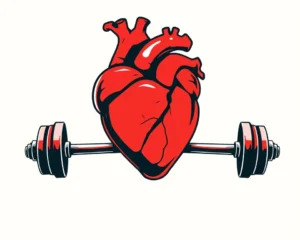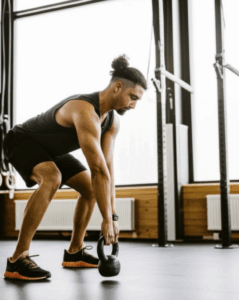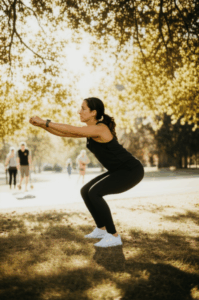Knowing what and when to eat around your workouts can significantly impact your performance, recovery, and overall results. This guide provides you with the knowledge to strategically fuel your body, whether you’re aiming to build muscle, lose weight, or simply optimize your fitness routine.
Why Nutrition Timing Matters
“Nutrition timing” refers to the practice of strategically consuming nutrients around your workouts to maximize their impact. This involves understanding how your body utilizes energy during exercise and how to replenish and repair muscle tissue afterward. By paying attention to what you eat and when, you can enhance your energy levels, prevent muscle breakdown, reduce soreness, and promote faster recovery.
Eating Before a Workout: Fueling for Performance
Consuming the right nutrients before exercise provides your body with the energy it needs to perform at its best. Here’s a breakdown of what to consider:
Benefits of Eating Before a Workout
- Increased energy levels: Eating carbohydrates before a workout provides your muscles with readily available fuel, allowing you to work out harder and for longer.
- Improved endurance: By stabilizing blood sugar levels, pre-workout meals can help prevent energy crashes and fatigue during exercise.
- Prevention of muscle breakdown: Consuming protein before a workout can help reduce muscle breakdown and strain.
- Enhanced performance: Studies show that eating or drinking carbohydrates before exercise can help you push yourself harder and maximize results.
What to Eat Before a Workout
The ideal pre-workout meal should include a combination of carbohydrates, protein, and healthy fats. However, the specific types and amounts of each macronutrient will depend on the timing of your meal and the type of exercise you’re planning to do.
- Carbohydrates: Carbohydrates are the primary fuel source for your muscles during exercise. Opt for complex carbohydrates like whole grains, fruits, and vegetables, which provide sustained energy. Simple carbohydrates, such as those found in fruit, can provide a quick energy boost if you’re eating close to your workout.
- Protein: Protein helps prevent muscle breakdown and promotes muscle recovery. Choose lean protein sources like chicken, fish, eggs, or Greek yogurt.
- Healthy Fats: Healthy fats provide a sustained source of energy for longer workouts. Good sources include avocados, nuts, and seeds.
Pre-Workout Meal Timing
- Large Meal (2-3 hours before): If you have 2-3 hours before your workout, aim for a complete meal containing complex carbohydrates, lean protein, and healthy fats. Examples include:
- Sandwich on whole-grain bread with sliced chicken and a side salad
- Lean ground beef, brown rice, and roasted vegetables
- Vegetable risotto with peas or Pad Thai with tofu or chicken
- Small Meal or Snack (1-2 hours before): If you have 1-2 hours before your workout, opt for a smaller meal or snack that is easy to digest. Focus on carbohydrates and protein. Examples include:
- Oatmeal with low-fat milk and fruit
- Greek yogurt and fruit
- Whole grain crackers with cheese
- Toast & nut butter
- Quick Snack (30-60 minutes before): If you only have 30-60 minutes before your workout, choose a quick and easily digestible source of carbohydrates. Examples include:
- Banana
- Apple slices with peanut butter
- Fruit smoothie
- Energy gel (for endurance activities)
Foods to Avoid Before a Workout
- High-fat foods: Fatty foods take longer to digest and can leave you feeling sluggish. Avoid fried foods, processed meats, and excessive amounts of unhealthy fats.
- High-fiber foods: While fiber is important for overall health, too much fiber before a workout can cause bloating, gas, and stomach cramps. Limit your intake of cruciferous vegetables like broccoli and cauliflower, as well as beans and legumes.
- Spicy foods: Spicy foods can cause digestive discomfort and heartburn during physical activity.
- Sugary foods and drinks: Sugary foods and drinks can lead to an energy crash during your workout. Avoid candy, soda, and processed snacks.
- Alcohol: Alcohol can dehydrate you and impair muscle recovery.
Eating After a Workout: Replenishing and Repairing
Consuming the right nutrients after exercise helps your body recover, rebuild muscle tissue, and replenish energy stores.
Benefits of Eating After a Workout
- Muscle recovery and growth: Eating protein after a workout provides your muscles with the amino acids they need to repair and rebuild tissue.
- Replenished glycogen stores: Carbohydrates help replenish the glycogen stores that are depleted during exercise, providing you with energy for your next workout.
- Reduced muscle soreness: Consuming protein and carbohydrates after a workout can help reduce muscle soreness.
- Balanced hormones: Eating after exercise can help balance hormones like insulin, which boosts strength gains.
- Improved immunity: Your body’s immunity can decrease post-workout, but eating carbs can reinforce your immune system.
What to Eat After a Workout
The ideal post-workout meal should include a combination of protein and carbohydrates. The specific ratio of protein to carbohydrates will depend on the type of exercise you’ve done and your individual goals.
- Protein: Aim for 20-40 grams of high-quality protein after your workout. Good sources include:
- Chicken
- Fish
- Eggs
- Greek yogurt
- Cottage cheese
- Protein powder
- Carbohydrates: Choose complex carbohydrates to replenish glycogen stores. Good sources include:
- Whole grains (brown rice, quinoa, oats)
- Fruits (bananas, berries, apples)
- Vegetables (sweet potatoes, roasted vegetables)
- Healthy Fats: Include some healthy fats to support overall recovery and well-being. Good sources include:
- Avocado
- Nuts and seeds
- Olive oil
Post-Workout Meal Timing
Aim to eat a post-workout meal or snack within two hours of exercising. Some studies suggest that there’s a post-workout window of 30-60 minutes where muscles are hyper-receptive to nutrients. If that’s a category you tend to fall in, then eating within 30-60 minutes post-workout can be very beneficial for your body.. If you’re trying to build muscle or recover quickly, eating sooner rather than later may be beneficial.
Post-Workout Meal Ideas
- Grilled chicken with roasted vegetables and rice
- Egg omelet with avocado spread on whole-grain toast
- Salmon with sweet potato
- Tuna salad sandwich on whole grain bread
- Whole-grain toast and almond butter
- Quinoa bowl with sweet potatoes, berries, and pecans
- Oatmeal, whey protein, banana, and almonds
- Protein smoothie with fruit and yogurt
Post-Workout Snack Ideas
- Yogurt and fruit
- Peanut butter sandwich
- Low-fat chocolate milk and pretzels
- Post-workout recovery smoothie
- Turkey on whole-grain bread with vegetables
- Tuna and crackers
- Cottage cheese and fruits
- Rice crackers and peanut butter
Foods to Avoid After a Workout
- Fried foods: Fried foods are high in unhealthy fats and can slow down the absorption of nutrients.
- Sugary cereals: Sugary cereals have high sugar content that can lead to an energy crash after an initial spike in blood sugar.
- High-fat foods: High-fat foods slow down digestion, which may cause discomfort during exercise.
- Soda or sugary drinks: These drinks have high sugar content and empty calories without providing essential nutrients.
- Spicy foods: Spicy foods may cause digestive discomfort and heartburn during physical activity.
- Alcohol: Alcohol can be dehydrating and can impair muscle recovery.
- Processed or fast food: Provide little nutritional value.
Exercising on an Empty Stomach: Is It Right for You?
Exercising on an empty stomach, also known as fasted exercise, can increase your body’s ability to use fat for fuel. However, it’s not for everyone.
Benefits of Exercising on an Empty Stomach
- Increased fat burning: When you exercise fasted, your body is more likely to tap into its fat stores for energy.
- Improved insulin sensitivity: Fasted exercise may improve insulin sensitivity, which can help regulate blood sugar levels.
Drawbacks of Exercising on an Empty Stomach
- Reduced energy levels: You may experience lower energy levels and fatigue during fasted exercise, especially during high-intensity workouts.
- Muscle breakdown: Your body may break down muscle tissue for energy if it doesn’t have enough glycogen to fuel your workout.
- Lightheadedness: Not eating might make you feel slow-moving or lightheaded when you exercise
Who Should Avoid Exercising on an Empty Stomach?
- People with diabetes
- Individuals prone to low blood sugar
- Those engaging in high-intensity exercise
- Anyone who experiences dizziness or lightheadedness during fasted exercise
How Long to Wait to Exercise After Eating
The amount of time you should wait to exercise after eating depends on the size of your meal and the intensity of your workout.
- Large Meal: Wait 2-3 hours after eating a large meal before exercising.
- Small Meal: Wait 1-2 hours after eating a small meal before exercising.
- Snack: Wait 30-60 minutes after eating a snack before exercising.
The Importance of Hydration
Staying hydrated is crucial for optimal performance and recovery. Drink plenty of water before, during, and after your workouts. For longer workouts (over 60 minutes), consider a sports drink to replenish electrolytes lost through sweat.
Listen to Your Body
Ultimately, the best way to determine what and when to eat around your workouts is to listen to your body. Pay attention to how different foods and timing strategies affect your energy levels, performance, and recovery. Experiment with different approaches to find what works best for you.







